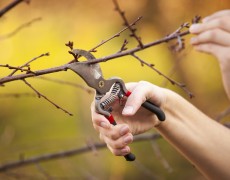Pruned by the Gardener

Pruning a vine or a fruit tree is one of the most counter-intuitive exercises for amateur gardeners such as myself. The whole idea is to see this plant grow and produce a bountiful harvest of fruit. So why are we cutting back so many of the branches? How is this going to help it grow taller, fuller and full of fruit?
My wife and I just finished a round of pruning in our backyard. We have planted many fruit trees over the years, and it always seems strange to cut back the branches once the fruit has been collected for the season. Our memory of the tree — full of healthy branches weighed down with fruit — is still fresh in our minds, and we only want to see the tree grow larger and more productive the following year. Inevitably, as we begin to clip away one branch after another, gathering a large pile at the foot of the tree, we are tempted to avoid the chore altogether. Maybe we should just let it grow naturally. After all, it’s a tree. It knows exactly how it needs to grow on its own.
In John 15, Jesus commands His disciples to remain in Him, bringing to mind a common metaphor which His disciples would have immediately understood. Jesus says, “I am the true vine, and my Father is the gardener.” (v. 1) He goes on to tell the disciples that “you are the branches,” and the Father “cuts off every branch in me that bears no fruit, while every branch that does bear fruit he prunes.” (v. 2)
Many times when we hear this passage, our focus is on how we are to abide in Christ, the true vine, so that we can bear much fruit. We hear Jesus’ words as a warning: we must remain in Christ to bear fruit, and if we bear no fruit, we will be like the branch that is cut off and thrown into the fire.
But we often miss the other part of Jesus’ teaching: every branch is either cut off, or it is pruned. In that sense, even those branches that bear fruit will be cut back in some manner.
How does the Lord prune those who bear fruit so that we bear even more fruit? There are many ways, but one that often gets overlooked is a season of trials or testing, experiences that pull us back from our tendency towards self-reliance, requiring us to deepen the way we abide in the Lord for our very sustenance. (2 Cor. 1:8-10)
Of course, not all suffering comes about in order to prepare us for more fruitful ministry. To say that all suffering is for such a purpose inverts the logic of the statement, a classic example of how living the Christian life according to a formula or a bumper sticker slogan leads to a misapplication of these verses. While it is true that one way we are pruned is through hardship, not every hardship we encounter is intended for our pruning.
It is a good reminder that even those who are fruitful need to be cut back in some way. And while a tree can certainly grow on its own, the Gardener knows exactly how it would grow best, and uses the many tools at His disposal to shape us for more productive fruit-bearing. It’s not often pleasant, but always for the good of Him who cultivates us for His greater good.

This Post Has 0 Comments